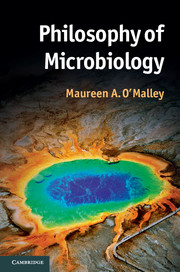Book contents
- Frontmatter
- Contents
- List of figures and tables
- Acknowledgements
- An introduction to philosophy of microbiology
- Chapter 1 Philosophy in microbiology; microbes in philosophy
- Chapter 2 Philosophical debates in high-level microbial classification
- Chapter 3 Philosophical debates in species-level microbial classification
- Chapter 4 Philosophical issues in microbial evolution
- Chapter 5 Microbial ecology from a philosophical perspective
- Chapter 6 Microbes as model biological systems
- Conclusion: further philosophical questions
- Glossary
- References
- Index
An introduction to philosophy of microbiology
Published online by Cambridge University Press: 05 September 2014
- Frontmatter
- Contents
- List of figures and tables
- Acknowledgements
- An introduction to philosophy of microbiology
- Chapter 1 Philosophy in microbiology; microbes in philosophy
- Chapter 2 Philosophical debates in high-level microbial classification
- Chapter 3 Philosophical debates in species-level microbial classification
- Chapter 4 Philosophical issues in microbial evolution
- Chapter 5 Microbial ecology from a philosophical perspective
- Chapter 6 Microbes as model biological systems
- Conclusion: further philosophical questions
- Glossary
- References
- Index
Summary
Philosophy of microbiology might seem like a highly specialized and even esoteric subfield of philosophy of biology. However, there are many good reasons to think that in fact microbes form the basis of all things biological and thus have major contributions to make to philosophy of biology. This chapter, and the book in general, will make that case.
The grounds for a philosophy of microbiology
Microbes are the most important, diverse and ancient life forms on our planet. The science of these organisms, microbiology, is the science of the most significant living entities and their influence on all the rest of life. Many philosophers will need to be persuaded of these claims, and this book will try to do that. Every scientific field has philosophical aspects, from how the objects of study are conceptualized to the ways in which those objects are known, but microbiology’s philosophical issues have only just begun to attract sustained attention from philosophers of biology. These philosophical aspects have driven many debates in microbiological research itself. This book will set out some central philosophical issues in microbiology, along with suggestions for how microbiological insight contributes to and even transforms philosophy of biology. I will start by making a case for philosophy of microbiology based on a general appreciation of the microbial world and its significance for all life. If the world we inhabit is indeed a microbial world, then many of the standard philosophical ways in which we conceive biological phenomena and how they are investigated will have to be rethought. Each of the following chapters deals with a particular aspect of that rethinking.
- Type
- Chapter
- Information
- Philosophy of Microbiology , pp. 1 - 15Publisher: Cambridge University PressPrint publication year: 2014



